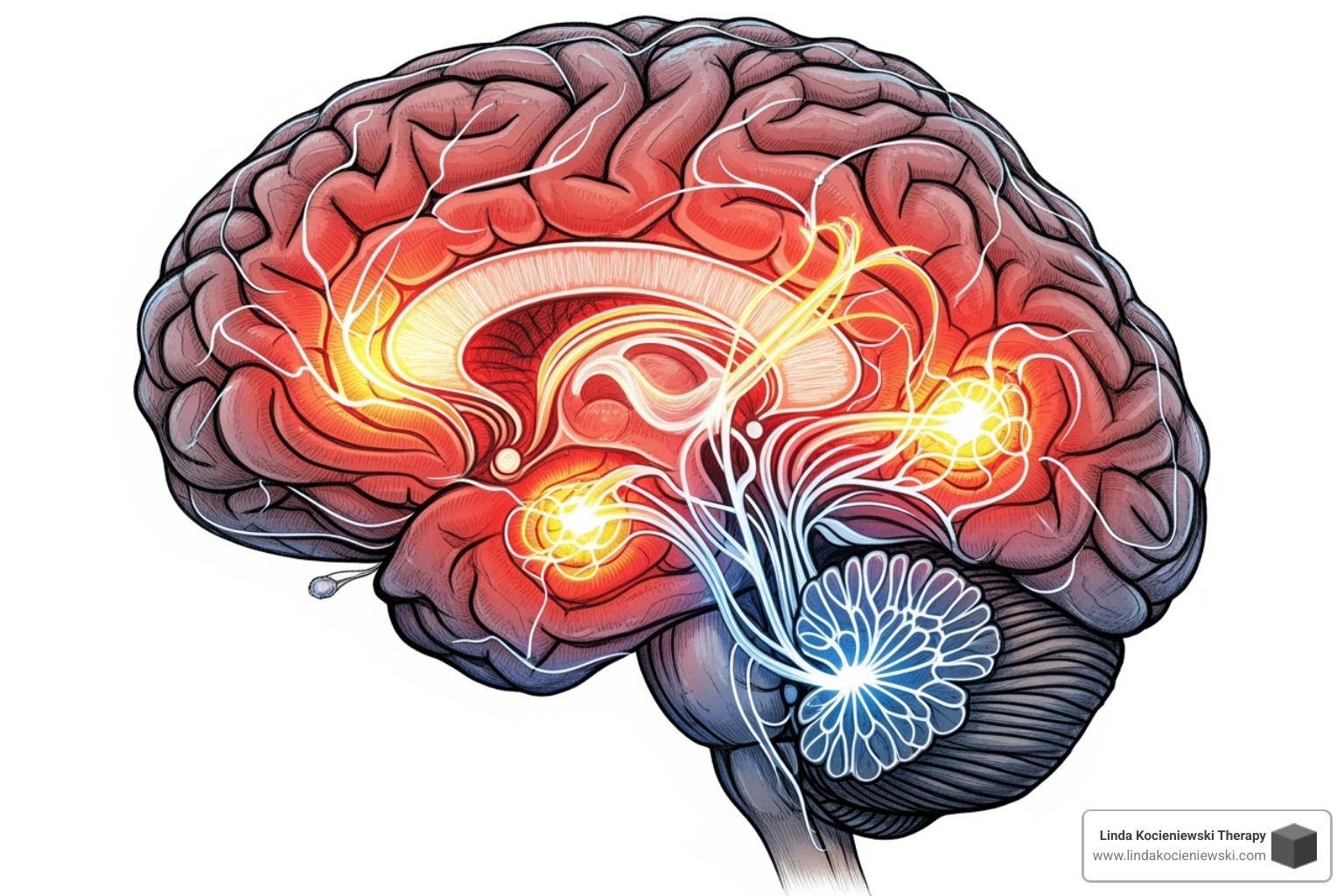Breathe Easy: How Therapy Can Help You Conquer Performance Jitters
Conquering Performance Jitters: How Therapy Can Help

Have you ever felt your heart race, palms sweat, or mind go blank before a big moment? If you dread getting up in front of people or feel intense pressure to perform, you're not alone. This is performance anxiety, a common challenge that can feel like an invisible barrier limiting your true potential.
Therapy for performance anxiety offers a path to overcome these struggles and perform with confidence. A personalized therapeutic approach can help you understand your anxiety's triggers, learn practical coping skills to calm your nervous system, challenge the negative thoughts that fuel your fear, and address the root causes of your anxiety. The goal is to build lasting confidence and a stronger sense of self-belief.
Performance anxiety is more than just "stage fright." It's a deep-seated fear that can hold you back from pursuing your passions and excelling in your career.
I am Linda Kocieniewski, a compassionate therapist specializing in helping individuals overcome performance anxieties. I use proven methods, including EMDR therapy, to facilitate deep healing and help you achieve peak performance.
Unpacking Performance Anxiety: More Than Just "Stage Fright"

Performance anxiety isn't just for musicians or actors; it can appear in any situation where you feel pressure to "do well," from a work presentation to a first date. It's an intense fear that you won't be able to accomplish a specific task, often stemming from a deep-seated fear of failure or judgment. While not a standalone diagnosis, it's often considered a type of social anxiety disorder (SAD) with a "performance-only specifier," as noted in the DSM-5.
This anxiety triggers the body's primal "fight-or-flight" response. Your sympathetic nervous system releases a flood of stress hormones like adrenaline and cortisol, preparing you to face a perceived threat. This isn't an imaginary threat to your brain; the fear of social humiliation can feel as real as a physical danger. A small amount of this arousal can sharpen focus—this is known as eustress, or beneficial stress. However, when the response becomes overwhelming, it becomes debilitating distress. You can learn more about the formal definition from the American Psychological Association: What is performance anxiety?.
The Common Symptoms You Might Experience
Performance anxiety manifests physically, emotionally, cognitively, and behaviorally. These symptoms are more than just "jitters"; they are disruptive signals that your nervous system is in overdrive.
- Physical (Somatic): A racing heart or palpitations, excessive sweating (especially palms), trembling or shaking in hands and legs, dry mouth or difficulty swallowing, shortness of breath, muscle tension in the neck and shoulders, and gastrointestinal distress like nausea or "butterflies."
- Emotional: Intense fear or panic, overwhelming worry, profound embarrassment or shame, a persistent sense of dread, and crippling self-doubt.
- Cognitive: A stream of negative self-talk ("I'm going to fail," "Everyone will see I'm a fraud"), catastrophizing (imagining the absolute worst-case scenario), an intense and narrow focus on potential failure, and the dreaded experience of your mind going blank.
- Behavioral: Proactive avoidance of performance situations (e.g., calling in sick on the day of a presentation), withdrawing from related social interactions, or a noticeable and frustrating decline in skills when under pressure.
Common triggers include public speaking, artistic performances (music, acting), athletic competitions, job interviews, academic exams, high-pressure work meetings, and even intimate encounters where there's a perceived need to "perform."
The Vicious Cycle of Performance Anxiety
Performance anxiety rarely exists only in the moment of performance. It operates in a self-sustaining, vicious cycle that can begin days or even weeks before an event. Understanding this cycle is the first step toward breaking it.
- Anticipatory Anxiety: The cycle begins with fearful anticipation. You ruminate on what could go wrong, visualizing failure and judgment. This mental rehearsal of disaster triggers the initial release of stress hormones, causing symptoms like poor sleep and irritability long before the event.
- In-the-Moment Anxiety: As the performance begins, the physical and cognitive symptoms spike. The racing heart, sweaty palms, and mental blankness you feared begin to manifest, becoming a self-fulfilling prophecy.
- Impaired Performance: These intense symptoms directly interfere with your ability. A musician's hands may shake, a speaker's mind may go blank, or an athlete's muscles may become too tense. Your focus shifts from the task to managing your internal state of panic.
- Post-Performance Rumination: After the event, instead of relief, you engage in harsh self-criticism. You replay every perceived mistake, magnify flaws, and interpret neutral audience reactions as negative. This post-mortem reinforces the core belief that you are not good enough and that performance situations are dangerous.
This cycle solidifies the fear, making the anticipatory anxiety for the next performance even stronger. Therapy for performance anxiety directly targets each stage of this cycle.
What Causes Performance Jitters to Take Hold?
Performance anxiety often has deep roots that therapy for performance anxiety can help uncover. The causes are usually complex and go beyond the immediate situation, often tying back to core beliefs about yourself and the world.
- Fear of Judgment and Failure: This is more than just worrying about a mistake; it's a profound fear that a flawed performance will lead to social rejection or confirm a deep-seated belief of being unworthy. It's the fear that your value as a person is on the line.
- Perfectionism: Setting impossibly high, rigid standards where anything less than flawless is seen as a total failure. Perfectionism is often a defense mechanism against feelings of shame or inadequacy. The internal critic says, "If I am perfect, no one can hurt me or find fault with me."
- Past Negative Experiences: A single, powerful negative event—being laughed at during a school play, receiving harsh criticism from a coach or boss, or fumbling a presentation—can become encoded in the brain as a traumatic memory. Your nervous system then flags all similar future situations as threats, triggering a disproportionate fear response.
- High Stakes: When a performance feels crucial for your career, academic standing, or personal life (e.g., a final exam, a championship game, a make-or-break sales pitch), the perceived pressure can amplify anxiety to unmanageable levels.
- Lack of Confidence or Preparation: Feeling unprepared can certainly fuel anxiety. However, sometimes the lack of confidence is a persistent feeling, like Imposter Syndrome, that exists even when you are highly skilled and well-prepared. It's the feeling that you're a fraud and will soon be finded.
- Unconscious Conflicts or Past Trauma: Deeper, unhealed experiences can be the primary driver. This can include developmental trauma, such as growing up with highly critical parents, where love and approval were conditional on achievement. These early experiences create a core belief that you must perform perfectly to be worthy of love and respect, a burden that gets unconsciously projected onto current performance situations.
Understanding these causes is key, as it shows why a quick fix often isn't enough. To learn more about how psychotherapy can help explore these issues, visit our page on psychotherapy services.
The Transformative Power of Therapy for Performance Anxiety

While self-help strategies can be useful, working with a trained professional offers a journey customized to your unique experiences and goals. Therapy for performance anxiety provides a safe, non-judgmental space to explore the layers of your anxiety. Instead of applying a temporary fix, we work as a team to understand and address the root causes that keep you in a cycle of fear.
The therapeutic relationship itself is a foundation for healing. This collaborative process helps you build genuine, lasting coping skills, focusing on long-term relief rather than quick fixes. The goal is to equip you with the confidence and resilience to face future challenges with a sense of grounded capability.
Challenging Anxious Thoughts: A Foundational Approach
A powerful tool in therapy is learning to reshape the thoughts that fuel your fear, a core principle of cognitive behavioral therapy (CBT). When anxious, our minds often default to distorted thinking patterns that feel true but aren't based in reality. Through cognitive restructuring, we learn to act like a detective, identifying these negative automatic thoughts and examining the cognitive distortions behind them.
Common distortions in performance anxiety include:
- Catastrophizing: Imagining the absolute worst-case scenario. "If I stumble on my words, the whole presentation will be a disaster, and my career will be ruined."
- Mind Reading: Assuming you know what others are thinking, usually negatively. "Everyone in the audience looks bored. They think I'm an idiot."
- Fortune Telling: Predicting the future with certainty, always with a negative outcome. "I know I'm going to freeze up during the Q&A session."
- Personalization: Believing you are the cause of events that have little or nothing to do with you. "The client seemed distracted; it must be because my pitch was terrible."
In therapy, you learn to catch these thoughts and challenge them by asking: "What's the evidence for this thought? What's a more balanced, realistic perspective?" The goal isn't forced positivity but developing balanced thinking. This process helps you build authentic self-confidence through positive self-talk grounded in reality. Research confirms the powerful link between our thoughts and performance, as detailed in studies like this one: How negative thoughts impact performance.
How EMDR Therapy Can Resolve the Root of Performance Fears
Sometimes, the roots of performance anxiety are tied to specific, distressing memories that cognitive approaches alone can't fully resolve. This is where Eye Movement Desensitization and Reprocessing (EMDR) therapy can be particularly powerful. As a therapist specializing in EMDR, I have seen how it creates profound shifts for those stuck in performance fears.
EMDR works on the principle that our brains can hold onto distressing memories—even seemingly minor "little t" traumas—in a way that keeps them emotionally charged and isolated from more adaptive information. For performance anxiety, this could be a memory of being criticized by a teacher, feeling humiliated after a presentation, or being harshly compared to a sibling. Your brain links these past events to current situations, triggering the fight-or-flight response as if the original event were happening all over again.
Consider a client, a talented marketing executive, who experienced debilitating anxiety before every major client pitch. Through EMDR, we traced this fear back to a vivid memory from the 7th grade of being laughed at by classmates while giving a book report. That memory was "stuck." During EMDR, using bilateral stimulation (e.g., eye movements), we reprocessed this memory. The process allowed his adult brain to connect with his younger self, offering the reassurance and perspective that was missing at the time. The memory didn't disappear, but it lost its emotional charge. The past event became unlinked from his current performance anxiety. He was then able to approach pitches with a sense of calm authority, free from the emotional baggage of his childhood self. This is especially effective for addressing developmental trauma that may have shaped your sense of worthiness.
Through EMDR, you build new, positive beliefs about your capabilities (e.g., from "I am a failure" to "I am competent and capable"), leading to a genuine improvement in performance. To learn more, visit our page on What is EMDR Therapy? or the EMDR International Association.
Practical Coping Skills Learned in Therapy for Performance Anxiety
Therapy also equips you with a practical toolkit of strategies to manage anxiety in the moment. These skills are personalized to help you feel more grounded and in control.
- Mindfulness and Grounding: Techniques like the 5-4-3-2-1 method (naming 5 things you see, 4 you feel, 3 you hear, 2 you smell, 1 you taste) pull you out of anxious thoughts about the future and anchor you in the present moment.
- Breathing Exercises: Simple but powerful methods like square breathing (inhale for 4, hold for 4, exhale for 4, hold for 4) or the 4-7-8 technique directly activate the vagus nerve, which switches your body from the sympathetic (fight-or-flight) to the parasympathetic (rest-and-digest) nervous system, creating a physiological state of calm.
- Visualization and Mental Rehearsal: This is more than just wishful thinking. By repeatedly and vividly imagining a successful performance—seeing the confident posture, hearing the steady voice, feeling the sense of accomplishment—you train your nervous system to expect a positive outcome, creating a new neural pathway that competes with the old fear-based one.
- Self-Compassion: Developed by Dr. Kristin Neff, this involves treating yourself with the same kindness you would offer a friend. It has three components: self-kindness (being gentle with yourself when you make a mistake), common humanity (recognizing that imperfection and struggle are part of the shared human experience), and mindfulness (observing your pain without judgment). This is crucial for breaking the cycle of post-performance rumination.
Your Path Forward: What to Expect from the Therapeutic Process

Taking the first step toward therapy for performance anxiety is a brave one. The therapeutic journey is deeply personal, and our process is designed around your unique needs, moving at a pace that feels right for you.
Your journey begins with a complimentary Zoom consultation. This is a chance for us to connect, for you to share what you're hoping to achieve, and for us to see if we are a good fit. If we agree to work together, we'll establish your goals for therapy.
Once care is established, we'll meet weekly. Consistency is crucial for building momentum and creating the safety needed for deeper work. In our sessions, I provide proven and effective therapies in a supportive manner, working as a team to help you move forward and foster improved well-being.
When Is It Time to Seek Professional Help?
While some nerves are normal, it may be time to seek professional support when your anxiety:
- Feels intense, recurring, or overwhelming. For example, you spend weeks dreading a single meeting, losing sleep and focus.
- Impairs your quality of life by causing you to turn down opportunities. You might say no to a promotion because it involves more public speaking, or avoid social events where you might be the center of attention.
- Negatively impacts your career or academic performance. Your grades are slipping because of test anxiety, or your performance reviews mention a lack of confidence in meetings.
- Leads to avoidance behaviors, causing you to miss out on important events. You consistently find excuses to get out of presentations, auditions, or even family toasts at weddings.
- Persists even after you've tried self-help strategies. You've read the books and tried the breathing exercises, but the underlying fear remains just as strong.
- Causes unmanageable physical symptoms like panic attacks, severe trembling, or dizziness that make it physically difficult to perform.
Seeking help is a sign of strength. If you're wondering if therapy is right for you, our insights on anxiety therapy in NYC may help.
The Typical Timeline and What a Personalized Journey Looks Like
There is no one-size-fits-all answer to "How long will therapy take?" Your journey is unique. However, many clients notice initial changes within 8-12 weeks of consistent therapy as they learn new coping skills and gain insight into their anxiety.
For more profound change, especially when addressing deeper root causes with EMDR, the process may unfold over several months. Progress isn't always linear; there will be ups and downs, which are valuable learning opportunities. Our therapeutic alliance is key to this process, whether we meet in-person in Midtown, Manhattan, or through online therapy for residents of New York State. For more on virtual sessions, read our article on online mental health counseling.
Complementary Lifestyle Habits to Support Your Therapy for Performance Anxiety
Integrating supportive lifestyle habits can significantly improve your therapeutic progress by creating a more resilient nervous system.
- Nutrition: A balanced diet can stabilize your mood. Be mindful of caffeine and sugar, which can cause energy spikes and crashes that mimic or worsen anxiety symptoms. Focus on complex carbohydrates, lean proteins, and healthy fats to maintain stable blood sugar. Nutrients like magnesium (found in leafy greens, nuts) and B vitamins (in whole grains, meat) are crucial for nervous system health.
- Exercise: Regular physical activity is a powerful anxiety reducer. Aerobic exercise (running, swimming, brisk walking) helps burn off excess adrenaline and cortisol and releases mood-boosting endorphins. Grounding activities like yoga or tai chi can also be beneficial, as they combine movement with mindfulness and breathwork to regulate the nervous system. Learn more about how exercise releases endorphins.
- Sleep Hygiene: Quality sleep is non-negotiable for emotional regulation. A tired brain is an anxious brain. Aim for 7-9 hours of consistent sleep, create a relaxing bedtime routine, and avoid screens an hour before bed. This is especially critical the night before a performance.
- Mindful Preparation vs. Anxious Rehearsal: There's a difference between practicing effectively and anxiously ruminating. Mindful preparation involves focused, time-limited practice sessions. Anxious rehearsal is endless, repetitive worrying that exhausts you without improving performance. In therapy, we can work on strategies to prepare confidently without tipping into obsession.
Frequently Asked Questions about Overcoming Performance Anxiety
Here are answers to some common questions about therapy for performance anxiety.
What is the difference between normal nerves and performance anxiety?
Normal nerves are a temporary, manageable response to a stimulating event. They can even sharpen focus and typically fade once you begin. Performance anxiety, on the other hand, is excessive, distressing, and often impairs your ability to perform. It involves intense fear, debilitating physical symptoms, and can lead to avoidance. While normal nerves are a manageable flutter, performance anxiety feels like an overwhelming threat.
Can performance anxiety be fully overcome?
The goal of therapy for performance anxiety is not to eliminate all nerves—a little arousal can be helpful—but to significantly reduce the symptoms and their impact. Through therapy, you can develop resilience and learn to manage anxiety so it no longer controls you. Many people reach a point where anxiety no longer limits their potential, allowing them to perform confidently and authentically. The key is to transform your relationship with performance, not to seek an unrealistic "cure."
Are medications like beta-blockers a good solution?
Beta-blockers (like propranolol) are sometimes prescribed to manage the physical symptoms of performance anxiety. They work by blocking the effects of adrenaline, which can reduce a racing heart, shaking, and sweating. For some, they can be a useful tool for specific, high-stakes situations. However, they are not a long-term solution for the anxiety itself. They act as a temporary physiological mute button but do not address the underlying psychological drivers: the negative thought patterns, unprocessed memories, and core beliefs that cause the anxiety in the first place. Therapy, especially approaches like CBT and EMDR, aims to resolve these root causes for lasting change, so you don't need to rely on a pill to feel confident.
How does EMDR work for anxiety that isn't from a "big" trauma?
EMDR (Eye Movement Desensitization and Reprocessing) is highly effective for any distressing memory that contributes to current struggles, not just "big T" traumas. Performance anxiety is often rooted in "little t" traumas—seemingly smaller past events that still carry an emotional charge. Examples include childhood pressure to succeed, harsh criticism after a presentation, or a single embarrassing performance.
EMDR helps your brain reprocess these memories, allowing them to lose their emotional power. When the old memory is no longer emotionally charged, it stops triggering an anxious fight-or-flight response in present-day performance situations. This allows you to let go of fears trapped in your mind and body and perform with newfound confidence.
Take Center Stage in Your Own Life
Performance anxiety does not have to be a permanent barrier holding you back from your career, passions, or personal goals. It is a common and highly treatable challenge that whispers lies about your capabilities and your worth. By understanding its roots and learning to manage its symptoms through a personalized therapeutic approach, you can build an unshakable, authentic confidence that comes from within.
This journey is about more than just getting through your next presentation; it's about reclaiming the parts of your life that fear has made small. It's about changing your relationship with yourself, from one of harsh criticism to one of self-compassion and resilience.
As a solo therapist, I specialize in guiding individuals through this journey, using proven modalities like EMDR therapy to resolve the underlying experiences that fuel performance fears. At Linda Kocieniewski Therapy, my goal is to help you move beyond simply coping and toward true healing and significant performance improvement.
If you are ready to transform your relationship with performance and step confidently into the spotlight of your own life, I invite you to take the first step. Let's connect to explore how I can support you.
Schedule your complimentary Zoom consultation. It's a no-pressure conversation to discuss your situation and how EMDR therapy and other effective approaches can help you flourish.